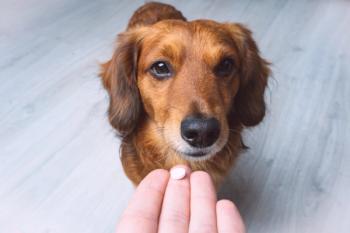
Practical Matters: Use lower doses of oxytocin for dystocia
Oxytocin is a pituitary hormone that causes strong, coordinated contractions of the estrogen-primed uterus during parturition. It may be used therapeutically to relieve nonobstructive dystocia in bitches.
Oxytocin is a pituitary hormone that causes strong, coordinated contractions of the estrogen-primed uterus during parturition. It may be used therapeutically to relieve nonobstructive dystocia in bitches.
Margaret V. Root Kustritz, DVM, PhD, DACT
Historically, doses of 5 IU or more of oxytocin per dog, administered subcutaneously or intramuscularly, were recommended. Recent work using a tocodynamometer, which assesses changes in abdominal pressure and allows the tracking of uterine contractility, has demonstrated that intramuscular doses of 5 IU or more are associated with uterine tetany and that intramuscular doses as low as 0.25 IU of oxytocin may stimulate effective contractions.1 Oxytocin does not dissociate readily from myometrial receptors, so there is little wisdom in continuing treatment if labor does not progress.
In patients with nonobstructive dystocia that has been verified by radiography, 0.25 to 5 IU of oxytocin may be given intramuscularly at 20- to 30-minute intervals for two or three doses. Suggested initial doses are 0.25 IU for dogs weighing less than 11 lb (5 kg), 0.5 to 1 IU for dogs weighing 11 to 22 lb (5 to 10 kg), 1 to 3 IU for dogs weighing 22 to 66 lb (10 to 30 kg), and 3 to 5 IU for dogs weighing more than 66 lb (30 kg). If there is no response to the initial oxytocin injection, progressively higher doses may be used, with an upper dose limit of 5 IU. After this treatment, if dystocia is not resolved, a cesarean section is indicated.
Margaret V. Root Kustritz, DVM, PhD, DACT
Department of Veterinary Clinical Sciences
College of Veterinary Medicine
University of Minnesota
St. Paul, MN 55108
REFERENCE
1. Davidson AP. Uterine and fetal monitoring in the bitch. Vet Clin North Am Small Anim Pract 2001;31:305-313.
Newsletter
From exam room tips to practice management insights, get trusted veterinary news delivered straight to your inbox—subscribe to dvm360.






